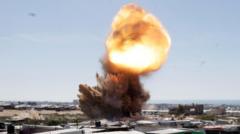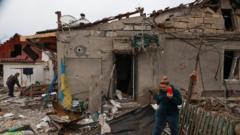A senior Palestinian official has informed the BBC about a new ceasefire proposal negotiated by Qatar and Egypt, seeking a truce lasting between five and seven years, alongside prisoner exchanges and other terms. The plan comes after the recent collapse of previous ceasefires amid ongoing violence, with both sides hesitant to compromise.
New Ceasefire Proposal Emerges for Israel-Gaza Conflict

New Ceasefire Proposal Emerges for Israel-Gaza Conflict
Mediators from Qatar and Egypt present a new ceasefire plan aimed at ending the ongoing war in Gaza.
The continuous cycle of violence between Israel and Hamas has prompted renewed mediation efforts involving Qatari and Egyptian officials. According to a senior Palestinian source speaking to the BBC, a new ceasefire proposal has been introduced, aiming for a truce lasting between five to seven years. Essential components of the proposed agreement include the release of all Israeli hostages in exchange for Palestinian prisoners currently held in Israeli jails, a formal declaration ending the conflict, and a complete Israeli withdrawal from the Gaza Strip.
A delegation from Hamas, including political council head Mohammed Darwish and chief negotiator Khalil al-Hayya, is expected to arrive in Cairo for discussions regarding this new proposal. The previous ceasefire, which collapsed last month, was marked by resumed Israeli bombings, with both parties blaming each other for the breakdown. Israel has yet to publicly comment on the proposed ceasefire terms.
Israeli Prime Minister Benjamin Netanyahu has expressed strong resistance to ending military operations until Hamas is dismantled and all hostages are returned. Contrarily, Hamas has indicated that they would prefer a commitment from Israel to halt military actions before any discussions regarding hostages take place.
Despite these complexities, the Palestinian official involved in the negotiations described the mediation efforts as serious, noting that Hamas has displayed unprecedented flexibility. Furthermore, the source revealed that Hamas might be willing to transfer governance of Gaza to a Palestinian entity, potentially the Palestinian Authority (PA) or another administrative body, contingent upon national and regional consensus. Netanyahu, however, has dismissed any possibility of the PA playing a role in Gaza's future governance.
Overall, the backdrop of escalating violence continues to affect the humanitarian situation, with reports indicating significant casualties on both sides since the onset of the current conflict. On October 7, Hamas launched a surprise attack on Israel, leading to considerable loss of life and the subsequent military response by Israel. As talks proceed in Cairo, the future of Gaza remains uncertain, with critical decisions ahead for all parties involved.
A delegation from Hamas, including political council head Mohammed Darwish and chief negotiator Khalil al-Hayya, is expected to arrive in Cairo for discussions regarding this new proposal. The previous ceasefire, which collapsed last month, was marked by resumed Israeli bombings, with both parties blaming each other for the breakdown. Israel has yet to publicly comment on the proposed ceasefire terms.
Israeli Prime Minister Benjamin Netanyahu has expressed strong resistance to ending military operations until Hamas is dismantled and all hostages are returned. Contrarily, Hamas has indicated that they would prefer a commitment from Israel to halt military actions before any discussions regarding hostages take place.
Despite these complexities, the Palestinian official involved in the negotiations described the mediation efforts as serious, noting that Hamas has displayed unprecedented flexibility. Furthermore, the source revealed that Hamas might be willing to transfer governance of Gaza to a Palestinian entity, potentially the Palestinian Authority (PA) or another administrative body, contingent upon national and regional consensus. Netanyahu, however, has dismissed any possibility of the PA playing a role in Gaza's future governance.
Overall, the backdrop of escalating violence continues to affect the humanitarian situation, with reports indicating significant casualties on both sides since the onset of the current conflict. On October 7, Hamas launched a surprise attack on Israel, leading to considerable loss of life and the subsequent military response by Israel. As talks proceed in Cairo, the future of Gaza remains uncertain, with critical decisions ahead for all parties involved.





















